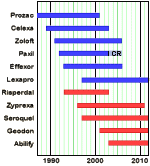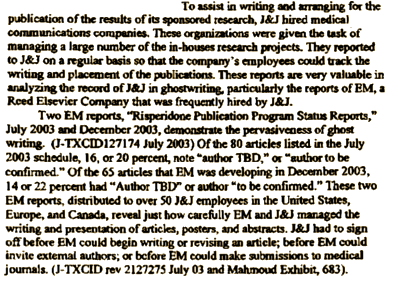I think there are all kinds of people around out there who have been as bothered with what’s gone on in psychiatry as I have, but have been quiet – the particular thing didn’t by itself rise to the level of alarm, or they were too busy with other matters, or maybe discouraged by the whole scene, or didn’t think they mattered enough to do anything, or maybe they were just lazy. I think I was all of those things at one time or another. I know that with me, there was another muzzle. I’m a psychoanalyst and we haven’t been so very popular since the days of the DSM-III, some deserved and some as Straw Men for the "unscientific." The fact that at that time, the overwhelming majority of us were psychiatrists didn’t matter because the whole charge was that we had too much influence in psychiatry. I expect some biological psychiatrists were quiet for the opposite reason – finally feeling they had a voice, not wanting to lose it by challenging their "thought leaders." None of those are legitimate reasons for being quiet. I’ve got nothing to say about that other than as a mea culpa for ignoring things that needed not to be ignored.
One of the things that has bothered me particularly over the years are "fads." Somebody has an idea, and all of a sudden, it’s everywhere. One such fad has been "augmentation" of antidepressants – the idea that if you’re dissatisfied with the response, you can "augment" it by adding a second drug. Even though it’s a concept mentioned all the time, it was unfamiliar to me before the days of modern psychiatry. I knew of "potentiation," one drug increasing the potency of another. An example is the routine use of Phenergan [promethazine] with Morphine – a standard preoperative maneuver. And then there’s "combined" therapy. Examples are using two or more antibiotics that have different mechanisms of action to treat Tuberculosis, or combination therapy in AIDS, or in hypertension. Since we have no such precise knowledge in psychiatry, "augmentation" isn’t exactly either one of those things. I guess it’s a variation on the idea that "two heads are better than one."
Use of Atypical Antipsychotics in Refractory Depression and Anxiety
by Charles B. Nemeroff, M.D., Ph.D.
Journal of Clinical Psychiatry 2005 66[suppl 8]:13–21.
[full text on-line]
Treatment options for bipolar depression and treatment-resistant unipolar depression include augmentation of antidepressant therapy with a nonantidepressant drug, including atypical antipsychotics. Risperidone is effective in combination with fluvoxamine, paroxetine, or citalopram in treatment resistant unipolar depression, with reported remission rates of 61% to 76%. Olanzapine in combination with fluoxetine is safe and effective in patients with bipolar depression and those with fluoxetine-resistant unipolar depression. Ziprasidone and aripiprazole augmentation of various selective serotonin reuptake inhibitors has been reported to be effective in refractory unipolar depression in open-label studies. Data on use of quetiapine or clozapine as augmentation therapy for depression or anxiety are not yet available. Further double-blind, placebo-controlled studies of augmentation of antidepressants with atypical antipsychotics in refractory depression and anxiety are justified based on the available literature.
From the Department of Psychiatry and Behavioral Sciences, Emory University School of Medicine, Atlanta, Ga. This article is derived from the planning roundtable “New Therapies for Treatment-Resistant Depression and Anxiety,” which was held September 28–29, 2003, in Atlanta, Ga., and supported by an educational grant from Janssen Medical Affairs, L.L.C.
 Back to "augmentation" strategies using anti-psychotics in "treatment resistant depression." Around the time this review was written, "augmentation" was a "fad." Since it was when the patents were running out on the SSRIs and in the mid-cycle for the atypical anti-psychotic’s patents, the "augmentation fad" was plenty suspect. I’m not objecting to the "augmentation" strategies that weren’t profit driven [Lithium, Thyroxine] though I’ll admit to some skepticism. But this one with the atypical anti-psychotics sets off all my alarm bells. And if you take a gander through the references to this article, a lot of our old pharma-friendly friends are right in the center of the atypical anti-psychotic augmentation of anti-depressants fad.
Back to "augmentation" strategies using anti-psychotics in "treatment resistant depression." Around the time this review was written, "augmentation" was a "fad." Since it was when the patents were running out on the SSRIs and in the mid-cycle for the atypical anti-psychotic’s patents, the "augmentation fad" was plenty suspect. I’m not objecting to the "augmentation" strategies that weren’t profit driven [Lithium, Thyroxine] though I’ll admit to some skepticism. But this one with the atypical anti-psychotics sets off all my alarm bells. And if you take a gander through the references to this article, a lot of our old pharma-friendly friends are right in the center of the atypical anti-psychotic augmentation of anti-depressants fad.
On my first time through the Rothman Report, I couldn’t stay with the ghostwriting examples. I kept getting sidetracked – googling Excerpta Medica, anything to divert my attention from what I was reading. Usually, when we’re talking about ghost-writing, we define it by who wrote the first draft. With J&J, the early drafts [or whole articles] were often written before the author was picked:Rothman included these two reports to show how many articles were written prior to the authors even being chosen [TBD], but there’s something else. "Of the 80 articles listed in the July 2003 schedule …" "Of the 65 articles that EM was developing in December 2003 …" The number of articles being written [ghost-written] is in itself staggering. When we say the literature was being flooded, we aren’t kidding. So it looks like Janssen and Excerptia Medica have a close working relationship:That whole decade [1995-2005] must have been the apogee of some kind of curve – the flagrant disregard for even the appearance of scientific integrity [not that the curve has fallen even yet].
There’s an amazing place in South Georgia unlike any other – the Okefenokee Swamp. The name comes from an extinct Seminole dialect and means "trembling earth," but that doesn’t do justice to what the word describes. All the wooded land in the swamp looks like terra firma, but it isn’t. It’s eons of peat that actually continues to float. You can’t see it move, or really even feel it move, but it is moving nonetheless. You can’t feel it be still. So you never feel right, never get your footing. Adding to the effect, the water is filled with tannic acid which makes it a perfect mirror. If you take a photograph, it looks the same upright as upside down, and the water’s horizon often disappears. If there’s no wind to ripple the water, riding in a boat can feel like flying. The combination of the "trembling earth" and the "mirrored water" gives one a feeling of subtle disorientation that can’t be captured on film or in my words, but when you’re there, it can’t be escaped.


For what it’s worth, pharma companies have medical, legal, and regulatory review of all projects. These require full, highlighted references. And articles in supplements have been unacceptable as sources for close to a decade, simply because they are known to be so biased, and are virtually always the result of a ghostwriter.
Supplements became what are referred to as “bird cage liners” decades ago, when the ad salespeople at journals took them over. Prior to that, they had always been vetted as any other manuscript. But that went, so that supplements were essentially pay to publish. The journals made a lot of money for awhile, until people realized how useless and biased the articles usually were. With that, supplements became viewed as toilet paper. And what had been a very useful type of article was lost.
Good points, Talbot. For the Nemeroff review in 2005 that Dr. Nardo highlighted, here is the description of the review process for that Janssen-financed Supplement:
REVIEW PROCESS
Supplements to The Journal of Clinical Psychiatry undergo a different peer review than journal articles. Their review process involves 3 tiers: (1) the entire faculty discusses the content at a peer-review planning session; (2) the chair reviews
the activity for accuracy and fair balance; and (3) a member of the External CME Advisory Board reviews the activity to determine whether the material is evidence-based and objective.
This is just a way to allow bias to hide in plain sight. As a matter fact, Nemeroff’s review did not jibe with Janssen’s data on ClinicalTrials.gov. The differences were in the direction of making Risperdal look better. None of that was picked up in the so-called 3 tiered review.
Bernard, thanks for the interesting follow up. As a minor addition, there are generally some dead giveaways if something is written by a ghostwriter. First, the same writer usually writes a bunch of manuscripts, so you’ll hear the same tone and phrases from supposedly different people. Second, there are some phrases vastly overused by the group. For example, if you ever come across the phrase “a valuable addition to the physician’s armamentarium” that’s hack central. Also, look for overconfidence i stating a viewpoint or opinion as fact, rather than exploration of an issue.
Next time I’m in the area, I’m gonna check out that swamp.. Sounds interesting.
Pat,
It is one of my favorite places on earth. If you have litle ones, or can borrow some, do take them – and be sure to do the 2 hour boat ride.